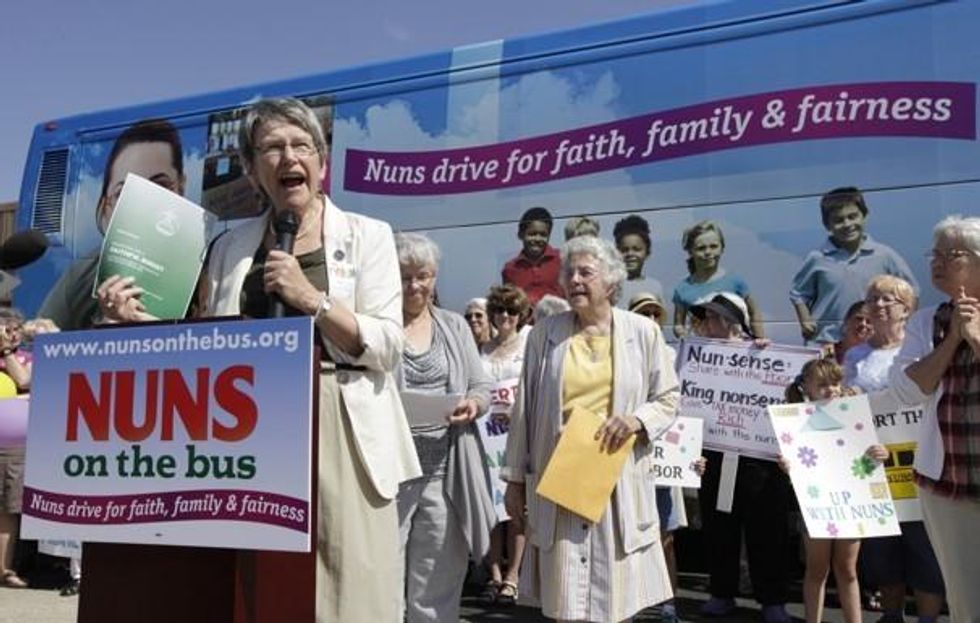With all the attention being paid this election to millionaire campaign donors and the importance of helping the middle class, candidates on both sides are overlooking one critical segment of our society. And it's not a small segment - in fact it numbers over 46 million people and potential voters.
People below the poverty line.
While I applaud any political candidate who puts the interests of the middle class ahead of the privileged class, we need to acknowledge that at this critical time in our nation's history, 46.2 million people live in poverty. We've heard more angry talk about how threatened cutbacks might impact a fictional TV puppet than we have over how it will affect actual families living on about $250 a week.
When one candidate dismisses 47 percent of all Americans as "victims," while his vice presidential pick dubs them "takers," it's time to shake off the stigma and recognize the true faces of the struggling Americans among us: returning veterans unable to find a job or too traumatized by their war experiences to look; senior citizens burdened by high healthcare costs and struggling to pay their grocery bills; men and women who have to settle for low-wage part-time work without benefits because they can't find a full-time job; people who can't make ends meet working for minimum wage. Many have paid their fair share of taxes throughout their working lives, taxes now funding government programs helping them retrain for new jobs, pay the rent and put food on the table. To them, "government" isn't a dirty word, it's a saving grace.
Income inequality has soared to the highest levels since the Great Depression. Yet productivity at many companies is climbing alongside profits - in part because company leaders made a business decision to keep wages and benefits low in order to keep costs down. Those profits aren't making it into the hands of working poor Americans. In fact, many of our nation's hard-working citizens don't earn enough to pull themselves out of poverty - never mind into the middle class. Programs like food stamps aren't luxury items like Pay-per-View or Caribbean vacations, to be easily cut from our family budget. In too many households, they are an absolute necessity. What greater American value can there be than making sure all people in the most prosperous nation on earth have enough to eat?
My organization, founded by Catholic sisters 40 years ago, lobbies Congress for economic justice. We're idealists, but we're not naive. There's no question that all government-run programs (including the military) need be held accountable and waste eliminated as much as possible in order to help fix budgetary woes. We agree that everyone willing and able to work should work. But when they can't, the government - by the people and for the people - has a moral obligation to lend a helping hand. What is naive is the belief that gaping holes in future budgets caused by decimating necessary social programs can and will be filled by church and community alone. That's way more bake sales than any of us can count.
Yet that could be the remaining safety net, considering that most analysts believe GOP budget proposals would require deep cuts in programs that benefit the most vulnerable people. I can only hope that the candidate who called us "all children of the same God" with such conviction during the last presidential debate remembers that line if given the political authority to send some of those children to bed hungry after inauguration day. The stark reality is, more money for the chosen few means less government applesauce for the many.
Motivated by deep cuts in the budget proposed by Congressman Paul Ryan, we began our "Nuns on the Bus" movement, starting with a 2,700-mile trip through nine states. Every day on the road, we heard from men, women and even children facing a cold hard truth: if the so-called "Ryan budget" is passed, slashing funding for social programs for families at the economic margins will cause suffering. Throughout our bus tour, we encouraged thousands of our fellow citizens to contact their elected officials and voice their opposition to unfair cutbacks.
In a presidential race as close as this one, practically any segment of our society turning out to vote has the opportunity to influence the outcome of an election and change the course of our nation. Here, now, people below the poverty line have that power. The stakes are higher for them in this election than any other demographic, yet the sad reality is that in developed countries like ours, people at the economic margins don't show up at the polls like those who are better off.
Now, with just days to go before the election, it's Hail Mary time for the underprivileged. If ever there was a time when low-income families and their advocates need to stand up and speak out it's now. When military pensions, disability compensation, housing assistance and child nutrition programs are on the chopping block, there's no time - or vote - to waste. "We the People" must harness our collective power in the one place where it truly doesn't matter if you're a billionaire or a bus boy, the one place where every American is equal in the eyes of the law and under God: at the polls.
Want to win this election, candidate Romney and candidate Obama? Recruit the vote of 46 million poor Americans.

